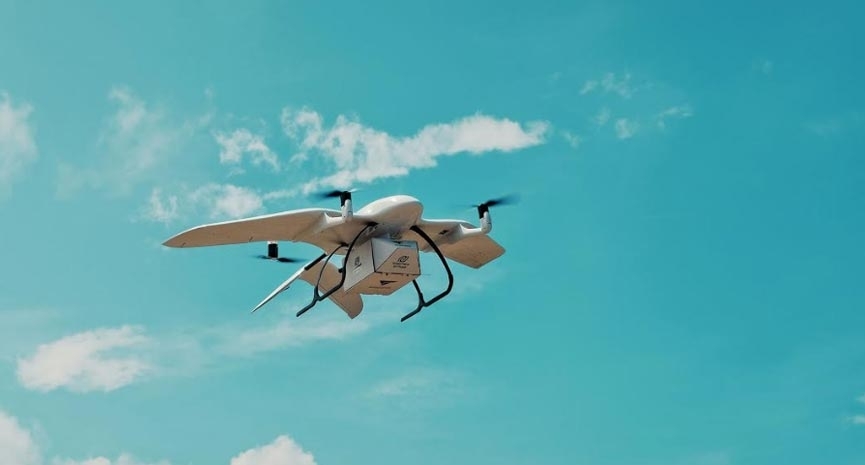Drone delivery is becoming a key link in African supply chains
Africa is on a fast-track to normalising drone delivery in the region. The cost and security benefits around unmanned aerial vehicles are rapidly being realised by the government authorities, nonprofit organisations and corporations, and the subject of drone delivery is confidently circumventing pervasive challenges of

Africa is on a fast-track to normalising drone delivery in the region. The cost and security benefits around unmanned aerial vehicles are rapidly being realised by the government authorities, nonprofit organisations and corporations, and the subject of drone delivery is confidently circumventing pervasive challenges of poor infrastructure for effective logistics operations in the African region. Africa’s enabling regulatory framework is greatly contributing to drive the technological maturity in the drone logistics segment, which is also attracting legitimacy outside Africa.
Integration of drones into supply chain has reduced the delivery time and proved as an effective answer to Africa’s protracted poor infrastructure. Drones in Africa, with its strong focus on healthcare, has proved a game changer, and continues to create a logistics response, in these Covid times, that is not only facilitating the increased demand for the critical supplies but also effectively reaching out to remote humanitarian emergency zones.
East African countries like Rwanda, Kenya, Malawi and South Africa have seen the most drone delivery action in the African region and the regulatory framework in these countries have truly sped up approvals for unmanned aircraft system operations. However, considering how drones are integrated into the supply chain, there is a growing concern among the civil aviation authorities about possible threats to privacy and security posed by the rapid proliferation of drone operations in the region.
Integrating drone delivery into supply chain
Companies are reportedly adopting drone delivery system by integrating it with their existing logistics model. With drones being deployed for various logistics operations like from warehouse management or inventory surveillance to last mile delivery.
In Malawi, we integrated drone operations with motorbikes, which already existed in the region, and needed to be complimented, particularly in the wet session. This is also a way for us to scale operations sustainably.
Sabrina Ravail, Swoop Aero
at a recent webinar conducted but the Logistics Update Africa on the topic: Drones for improving healthcare supply chains and creating drone corridors for Africa.
Another example of successful drone integration, which comes from US, involves a collaboration between UPS and Wingcopter. With Wingcopter drones’ capability of vertical takeoff and landing, UPS Flight Forward has integrated drone operations with its delivery vans, where in the van acts as a launch pad for the drones. Talking of a similar integration in Africa, Andi Fisanich, chief of staff at Wingcopter, confirmed during the webinar that “Having it (drones) land on a vehicle wouldn't be an issue for us. Our technology is there already and with the new rollout of our new models, it is just gonna get even more precise.”
To invigorate last mile delivery solutions in Africa, Astral Aerial Solutions announced a collaboration with Wingcopter. The announcement was made during the webinar by Geoffrey Nyaga, chief operations officer of Astral Aerial. Commenting on the collaboration, he said “Our aim is to develop a strong network and solutions across Africa for the expected Covid-19 vaccine.”
Security and privacy concerns surround drone delivery
As civil aviation authorities are mapping regulatory framework to accommodate drone operations for a rapid logistics response, there are some serious obstacles concerning security and privacy. How truly autonomous are these drone operations? How is the information captured from the aerial survey sensors is being used and decimated? These are some of the questions, along with the integrity of some of the equipments and cutting-edge technologies that are being used in drones, need answering.
Most regulators don't want a pilot with a hand on the joystick who can control things to go left and right and up and down. And so, for example, we have to take that capability away from our pilots and make drone operations truly autonomous.
Yaniv Gelnik, Zipline
The regulatory authorities are keen on having these drone delivery systems as autonomous as possible. “Most regulators don't want a pilot with a hand on the joystick who can control things to go left and right and up and down, which is not so intuitive, because you would think they would want more control. It turns out that there's a concern that there will be a security event and somebody will come and force the pilot to go left to right. And so, for example, we have to take that capability away from our pilots, and make drone operations truly autonomous. And the regulators, in case of an emergency, do need the ability to intervene and take certain action to stop a mission,” explained Yaniv Gelnik, global business development lead at Zipline, during the webinar.
Kenya Civil Aviation Authority (KCAA) has additional requirements in place concerning the privacy of the data that gets captured by some of the drone delivery operations. Lawrence K Amukono, chief national continuous monitoring coordinator at KCAA explained that “Drones have introduced challenge to people who are concerned about privacy — cameras, imaging devices and other sensors that are capturing information, and that is also controlled to a certain degree. And the regulations do not want people's privacy to be jeopardised by approving unmanned aircraft system operations. We are saying (information) captured, distribution, and publication is also controlled by law.”
Many companies and nonprofit organisations are increasingly endorsing for drone logistics in Africa to be entirely home brewed, from manufacturing the drones to operations. To build an African drone and create an ecosystem around unmanned aerial system, which is sustainable and remains vigilant not only for emergency responses but also for e-commerce, first-and last-mile deliveries and be demand driven.


